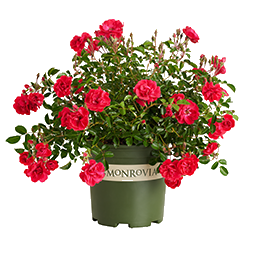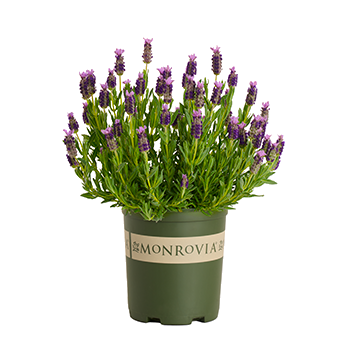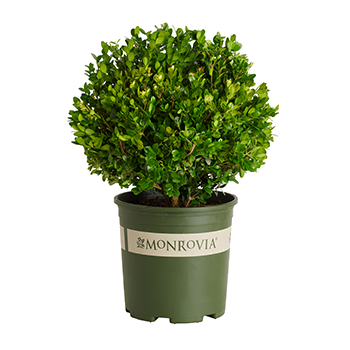You're growing in this Zip Code:
Change LocationDiscover Plants for Your Area
Trailing Lantana
Lantana sellowiana
Retailers Near You
| Description | A popular groundcover prized for its masses of beautiful lavender flowers that appear almost year-round on a naturally low, spreading form. Wonderful cascading over raised beds and hanging baskets, or as a container specimen. Excellent for erosion control on sunny hillsides and slopes. Evergreen in frost-free climates. |
|---|---|
| Bloom Time | Spring and summer; longer in frost-free areas |
| Deciduous/Evergreen | Evergreen |
| Special Features | Easy Care, Waterwise, Attracts Pollinators, Fast Growing, Benefits Birds |
| Problems/Solutions | Coastal Exposure, Deer Resistant, Erosion Control |
| Growth Rate | Fast |
| Growth Habit | Spreading |
| Flower Attributes | Long Bloom Season, Showy Flowers |
| Landscape Use | Border, Container, Ground Cover, Hillside |
| Design Ideas | Low and wide, trailing Lantana covers the ground quickly and in a blaze of color. Lavender flowers are perfect for dangling off the edges of pots and hanging baskets. Makes a perfect filler for young gardens the first season before large plants mature. Excellent choice for hot zones along streets and driveways, on sun-drenched slopes and embankments that need quick color. Great for covering curbs, retaining walls and utilities boxes. |
| Flower Color | Purple |
| Foliage Color | Green |
| Companion Plants | Salvia (Salvia); Heliotrope (Heliotrope); Cordyline (Cordyline); Red Yucca (Hesperaloe); Hibiscus (Hibiscus) |
| Care Instructions | Thrives in average, well-drained soils. Water deeply, regularly in first growing season to establish root system. Once established in the landscape, reduce frequency; continue to water container plants regularly. Space 3 to 5 ft. apart as groundcover. Fertilize in spring. Remove spent flowers for a tidy appearance. |
| History | Lantanas originate in the tropical regions of America and Africa where they are valued for the pungent aroma of the foliage. This trailing species is native to much of South America and has naturalized all over the southern United States, and in particular southern California. This species, L. sellowiana should be considered synonymous with L. montevidensis. |
| Lore | Lantana sellowiana is also known as L. montevidensis, named because it is native to the hills surrounding Uruguay capital city of Montevideo. A member of the Verbenacea family, it is sometimes referred to as Wild Verbena. Lantana species have been cultivated for nearly 300 years, and lore tells us it has been used for centuries longer in folk medicines; poultices for snake bites and sprains, and elixirs to treat ailments. It is said that the dried leaves burned in a glass jar are a natural mosquito repellent. However, it must be noted that the leaves and stems contain an alkaloid that is toxic to browsing animals, and the berries are poisonous. The bright, aromatic flowers of Lantana are adored by nectar-seeking wildlife, and as such are a a staple of a classic butterfly garden. |
| Description | A popular groundcover prized for its masses of beautiful lavender flowers that appear almost year-round on a naturally low, spreading form. Wonderful cascading over raised beds and hanging baskets, or as a container specimen. Excellent for erosion control on sunny hillsides and slopes. Evergreen in frost-free climates. |
|---|---|
| Bloom Time | Spring and summer; longer in frost-free areas |
| Deciduous/Evergreen | Evergreen |
| Special Features | Easy Care, Waterwise, Attracts Pollinators, Fast Growing, Benefits Birds |
| Problems/Solutions | Coastal Exposure, Deer Resistant, Erosion Control |
| Growth Rate | Fast |
| Growth Habit | Spreading |
| Flower Attributes | Long Bloom Season, Showy Flowers |
| Landscape Use | Border, Container, Ground Cover, Hillside |
|---|---|
| Design Ideas | Low and wide, trailing Lantana covers the ground quickly and in a blaze of color. Lavender flowers are perfect for dangling off the edges of pots and hanging baskets. Makes a perfect filler for young gardens the first season before large plants mature. Excellent choice for hot zones along streets and driveways, on sun-drenched slopes and embankments that need quick color. Great for covering curbs, retaining walls and utilities boxes. |
| Flower Color | Purple |
| Foliage Color | Green |
| Companion Plants | Salvia (Salvia); Heliotrope (Heliotrope); Cordyline (Cordyline); Red Yucca (Hesperaloe); Hibiscus (Hibiscus) |
| Care Instructions | Thrives in average, well-drained soils. Water deeply, regularly in first growing season to establish root system. Once established in the landscape, reduce frequency; continue to water container plants regularly. Space 3 to 5 ft. apart as groundcover. Fertilize in spring. Remove spent flowers for a tidy appearance. |
|---|
| History | Lantanas originate in the tropical regions of America and Africa where they are valued for the pungent aroma of the foliage. This trailing species is native to much of South America and has naturalized all over the southern United States, and in particular southern California. This species, L. sellowiana should be considered synonymous with L. montevidensis. |
|---|---|
| Lore | Lantana sellowiana is also known as L. montevidensis, named because it is native to the hills surrounding Uruguay capital city of Montevideo. A member of the Verbenacea family, it is sometimes referred to as Wild Verbena. Lantana species have been cultivated for nearly 300 years, and lore tells us it has been used for centuries longer in folk medicines; poultices for snake bites and sprains, and elixirs to treat ailments. It is said that the dried leaves burned in a glass jar are a natural mosquito repellent. However, it must be noted that the leaves and stems contain an alkaloid that is toxic to browsing animals, and the berries are poisonous. The bright, aromatic flowers of Lantana are adored by nectar-seeking wildlife, and as such are a a staple of a classic butterfly garden. |
Retailers Near You
About Us
We have been pioneers and craftsmen in the art of growing plants for nearly
100 years. Since our founding in Southern California by Harry E. Rosedale, Sr.
in 1926, we have been absolutely dedicated and obsessed with quality.
We have been pioneers and craftsmen in the art of growing plants for nearly 100 years. Since our founding in Southern California by Harry E. Rosedale, Sr. in 1926, we have been absolutely dedicated and obsessed with quality.








